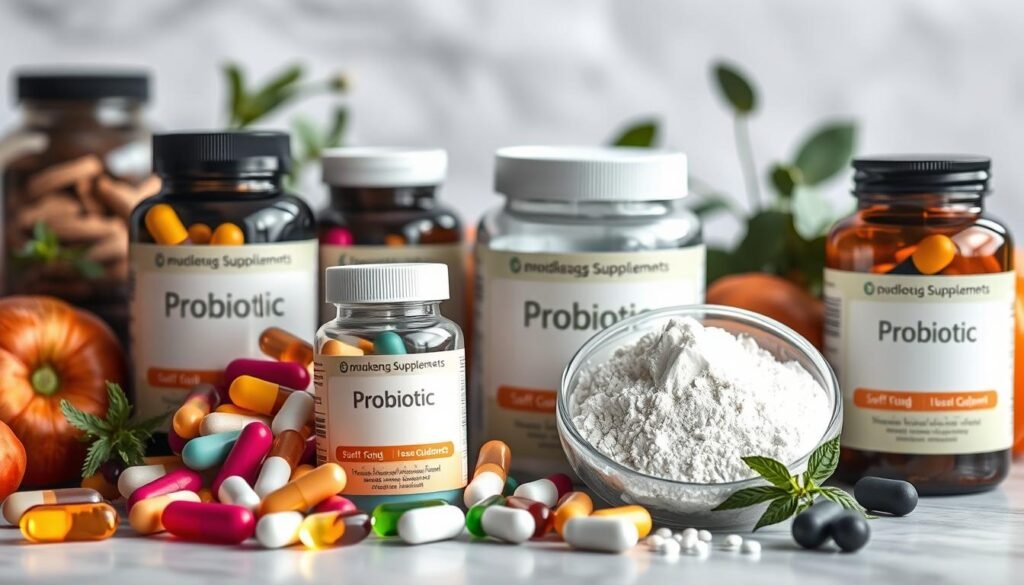Did you know that the average American adult has over 100 trillion gut bacteria? These microscopic organisms play a vital role in your overall health, from digesting food to regulating your immune system. Maintaining a balanced gut microbiome is essential for preventing common digestive issues like bloating, gas, and cramping. That’s where probiotic supplements come into play.
Probiotic supplements contain live, beneficial bacteria and yeasts that can help restore the natural balance of your gut flora. However, with so many options on the market, choosing the right probiotic for your specific needs can be overwhelming. In this comprehensive guide, we’ll explore the top 10 probiotic supplements that can help improve your digestive health and overall well-being.
Key Takeaways
- Probiotics regulate the gut microbiome and promote healthy digestion.
- Choosing the right probiotic depends on your specific needs, gastrointestinal issues, and symptom severity.
- Probiotic effectiveness is influenced by the strains, CFU count, and additional ingredients.
- American Gastroenterological Association (AGA) guidelines can help determine the role of probiotics in managing gastrointestinal disorders.
- Multi-strain probiotic supplements with clinically studied dosages are often recommended for optimal gut health benefits.
What Are Probiotics and Their Benefits?
Probiotics are live microorganisms that offer a range of health benefits by regulating the gut microbiome. These beneficial bacteria, such as Lactobacillus, Bifidobacterium, Saccharomyces, Streptococcus, Enterococcus, Escherichia, and Bacillus, work to alter the composition of the gut flora, potentially improving digestion, boosting immunity, and supporting overall wellness.
How Probiotics Work
Probiotics work by various mechanisms to maintain a healthy gut ecosystem. They can inhibit the growth of harmful bacteria, produce antimicrobial compounds, and compete for nutrients and attachment sites within the gut. This helps to restore the balance of the gut microbiome, which is crucial for proper digestive function and immune system support.
Benefits for Digestive Health
- Alleviate symptoms of digestive disorders, such as irritable bowel syndrome (IBS), inflammatory bowel disease, and antibiotic-associated diarrhea
- Improve lactose digestion and reduce symptoms of lactose intolerance
- Enhance nutrient absorption and support overall gut health
- Reduce inflammation in the gastrointestinal tract
- Strengthen the intestinal barrier and protect against pathogenic infections
By supporting a healthy gut flora, probiotics can have a positive impact on your digestive health and provide additional immune support. Incorporating probiotics into your routine can be a valuable step in maintaining overall well-being.
Factors to Consider When Choosing Probiotics
When it comes to selecting the right probiotic supplement, there are several key factors to consider. From the types of probiotic strains to the CFU (colony-forming unit) count, understanding these elements can help you make an informed decision that supports your unique digestive health needs.
Types of Probiotics
Probiotic supplements are classified by their genus, species, and subspecies. Some of the most common probiotic strains include Lactobacillus, Bifidobacterium, Bacillus, and Saccharomyces boulardii. Each type of probiotic strain may offer different benefits, so it’s important to consider your specific health goals when choosing a supplement.
CFU Count Explained
The CFU count on a probiotic label indicates the number of live, active bacteria in each serving. Most probiotic doses range from 1 to 10 billion CFUs, taken once or twice a day. However, some products may contain 50 billion CFUs or more. It’s important to note that the labeled CFU count typically represents the total for all probiotic types in the product, not just a single strain.
Strain-Specific Benefits
Different probiotic strains can offer targeted benefits for various digestive and overall health conditions. For example, Lactobacillus acidophilus and Bifidobacterium lactis may help lower cholesterol levels, while Saccharomyces boulardii can help reduce the risk of antibiotic-associated diarrhea. When selecting a probiotic, consider the specific strain(s) and their associated benefits.
Ultimately, choosing the right probiotic supplement involves considering the types of probiotic strains, the CFU count, and the specific health benefits associated with each strain. By understanding these factors, you can find a probiotic that best supports your individual needs and promotes optimal digestive health.
Top 10 Probiotic Supplements for Digestive Health
When it comes to supporting a healthy gut, probiotic supplements can be a valuable addition to your daily routine. These beneficial bacteria play a crucial role in maintaining digestive function, immune system health, and overall well-being. Let’s explore some of the top probiotic supplements that can help improve your digestive health.
1. Garden of Life Dr. Formulated Probiotics
This comprehensive probiotic formula from Garden of Life features 14 probiotic strains, including the popular Lactobacillus acidophilus, to support immune function and digestive health. With 50 billion colony-forming units (CFUs) per serving, this supplement can help restore the balance of gut flora.
2. Culturelle Digestive Health Probiotic
Culturelle’s probiotic supplement contains the well-researched strain Lactobacillus rhamnosus GG, which has been shown to help improve symptoms of diarrhea, constipation, and other digestive issues. With 10 billion CFUs per capsule, this supplement can help strengthen your gut’s natural defenses.
3. Renew Life Ultimate Flora Probiotic
Renew Life’s Ultimate Flora probiotic offers a high-potency blend of 30 billion CFUs, including strains like Bifidobacterium and Lactobacillus. This supplement is designed to support overall gut health and promote regularity, making it a great choice for those looking to maintain a balanced digestive system.
4. Bio-K Plus Probiotic
The Bio-K Plus probiotic features a unique blend of three Lactobacillus strains, providing 50 billion CFUs per serving. This supplement is particularly beneficial for supporting the immune system and alleviating symptoms of antibiotic-associated diarrhea.
Remember, when choosing a probiotic supplement, it’s important to consider factors like the number of CFUs, the specific strains included, and any additional ingredients that may be beneficial for your individual needs. Consulting with a healthcare professional can also help you find the right probiotic supplement to support your digestive health.
How to Incorporate Probiotics into Your Diet
Probiotics, the beneficial bacteria that support gut health, can be easily incorporated into your everyday diet. Natural food sources of probiotics include a variety of fermented items like yogurt, kimchi, pickles, sauerkraut, kombucha, kefir, sourdough bread, and cottage cheese.
Food Sources of Probiotics
- Yogurt is associated with improved bone, heart, and gastrointestinal health, as well as reduced risk of diabetes, breast and colon cancer, and improved weight management.
- Kefir is considered a better source of probiotics than yogurt and is beneficial for bone health, digestive problems, and lactose intolerance.
- Sauerkraut, a traditional food, contains fiber, vitamins C and K, high sodium, as well as iron and potassium.
- Tempeh, a meat substitute, contains vitamin B12, known to be lacking in soybeans, making it a good option for vegetarians.
- Kimchi, a spicy Korean side dish, is high in vitamins and minerals including vitamin K, riboflavin (vitamin B2), and iron.
- Miso, a Japanese seasoning, is high in protein, fiber, vitamins, minerals, and plant compounds, and may help regulate cholesterol and protect against cancer and obesity.
- Kombucha, a fermented tea drink, possibly lowers the risk of cancer and diabetes, but further human studies are needed to confirm these benefits.
Best Times to Take Supplements
For probiotic supplements, it’s best to start with lower dosages and gradually increase as needed. The time it takes for probiotics to work varies based on strain, potency, purpose, and baseline gut health. Some people may experience temporary symptoms like gas, bloating, or diarrhea when first introducing probiotics.
By incorporating a variety of probiotic-rich foods and supplements into your diet, you can support your gut health and overall well-being.
Common Myths About Probiotics
When it comes to probiotics, there are several common misconceptions that can lead to confusion and prevent people from harnessing the full benefits of these beneficial bacteria. Let’s debunk some of the most prevalent myths about probiotics.
Myth: All Probiotics Are the Same
While all probiotics share the common goal of supporting gut health, different probiotic strains can have unique effects on the gut flora and the overall immune support. The specific combination and ratios of probiotic strains in a supplement can significantly impact its efficacy.
Myth: Probiotics Are Only for Digestive Issues
Probiotics have a far-reaching impact beyond just digestive health. Research suggests that maintaining a healthy gut flora can also benefit mental well-being, heart health, and even weight management through the gut-brain axis. Probiotics should be considered for overall wellness, not just for addressing gastrointestinal concerns.
Myth: Probiotics Can Be Overused
While it’s true that more is not always better when it comes to probiotics, the idea that they can be “overused” is a misconception. Probiotics are generally considered safe, and the body can typically self-regulate the levels of beneficial bacteria. However, it’s important to follow the recommended dosage and avoid consuming multiple probiotic-rich products simultaneously without consulting a healthcare professional.
By understanding and dispelling these common myths, you can make more informed decisions about incorporating probiotics into your lifestyle and reap the full benefits of these remarkable microorganisms.
Potential Side Effects of Probiotics
While probiotics are generally considered safe for most people, there are a few potential side effects to be aware of, especially when starting a new probiotic regimen. The most common side effects may include temporary gas, bloating, diarrhea, and abdominal cramps. These typically subside within a few days as your body adjusts to the new beneficial bacteria.
Common Side Effects
Some individuals may experience mild digestive discomfort, such as increased gas or bloating, when first taking probiotics. This is a normal reaction as the gut microbiome rebalances. In rare cases, probiotics may also cause diarrhea or abdominal cramps. These side effects are usually temporary and tend to resolve within a week or two as the body adapts to the new probiotic strains.
When to Consult a Healthcare Professional
- Probiotics may be harmful for people with certain underlying health conditions, such as critical illness, AIDS, organ transplantation, necrotizing enterocolitis, cancer, and severe allergies. If you have any of these conditions, it’s important to consult your healthcare provider before using probiotics.
- Probiotic use may also be risky for those with antibiotic-associated diarrhea or irritable bowel syndrome. Always speak to your doctor before incorporating probiotics into your regimen, especially if you have a pre-existing medical condition.
- In rare cases, probiotics may lead to skin problems like rashes or itchiness. If you experience any unusual side effects, discontinue use and consult your healthcare provider.
By being mindful of potential side effects and consulting your healthcare provider, you can safely incorporate probiotics into your routine and support your overall digestive health.

Tips for Maintaining Gut Health
Maintaining a healthy gut is crucial for overall well-being. Your gut is home to trillions of microorganisms, collectively known as the gut flora or gut microbiome, which play a vital role in digestion, nutrient absorption, and immune function. By incorporating a few simple lifestyle adjustments, you can support the diversity and balance of your gut microbiome, leading to improved digestive health and a range of other benefits.
Balanced Diet and Hydration
Nourishing your gut starts with a well-rounded diet. Include a variety of fiber-rich foods, such as fruits, vegetables, whole grains, and legumes, which act as prebiotic fuel for the beneficial bacteria in your gut. Fermented foods like yogurt, kefir, sauerkraut, and kimchi are excellent sources of probiotics, the live microorganisms that can help restore gut flora balance. Additionally, staying hydrated by drinking plenty of water can support the health and diversity of your gut bacteria.
Regular Exercise
Regular physical activity has been linked to improved gut health. Exercise can increase the diversity of your gut microbiome and enhance the overall function of your digestive system. Aim for at least 30 minutes of moderate exercise, such as brisk walking, swimming, or cycling, most days of the week.
Stress Management Techniques
Chronic stress can negatively impact your gut health, leading to an imbalance in your gut flora and potentially contributing to digestive issues. Incorporating stress management techniques, such as yoga, meditation, or deep breathing exercises, can help maintain a healthy gut-brain axis and support overall gut well-being.

By focusing on a balanced diet, staying hydrated, engaging in regular exercise, and managing stress, you can support the health and diversity of your gut microbiome, leading to improved digestive function, enhanced immune response, and a range of other benefits for your overall well-being.
Conclusion: Choosing the Right Probiotic for You
Selecting the appropriate probiotic supplement depends on your individual needs, health conditions, and specific goals. When choosing a probiotic, consider factors such as the types of probiotic strains, the colony-forming unit (CFU) count, and any additional ingredients that may enhance the effectiveness for your particular situation.
Recap of Key Points
Throughout this article, we’ve explored the definition of probiotics, how they work, and the numerous benefits they can provide for digestive health. We’ve also discussed the importance of understanding the different probiotic strains, the significance of CFU counts, and the strain-specific benefits that can address various health concerns.
Importance of Individual Needs in Selection
Remember that not all probiotics are created equal, and the “Top Top 10 Probiotic Supplements For Better Digestive Health” may not necessarily be the best fit for your individual needs. It’s crucial to consult with a healthcare professional or registered dietitian who can provide personalized guidance on the probiotic strains and formulations that may be most beneficial for you. Probiotics are not a one-size-fits-all solution, and incorporating them into a holistic approach to gut health, including diet, lifestyle, and overall wellness, is key to achieving optimal digestive well-being.

